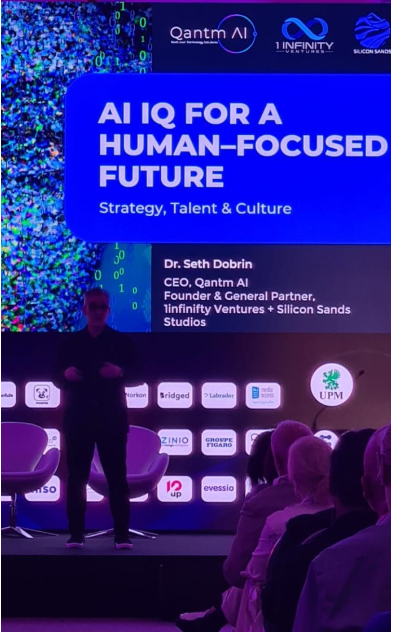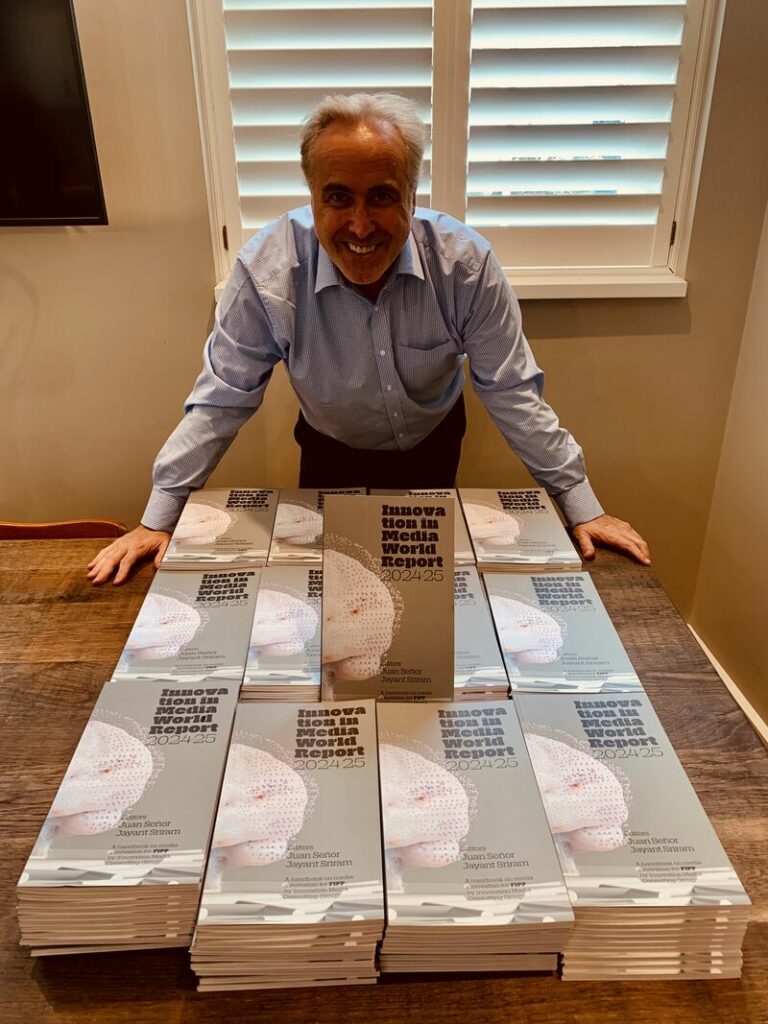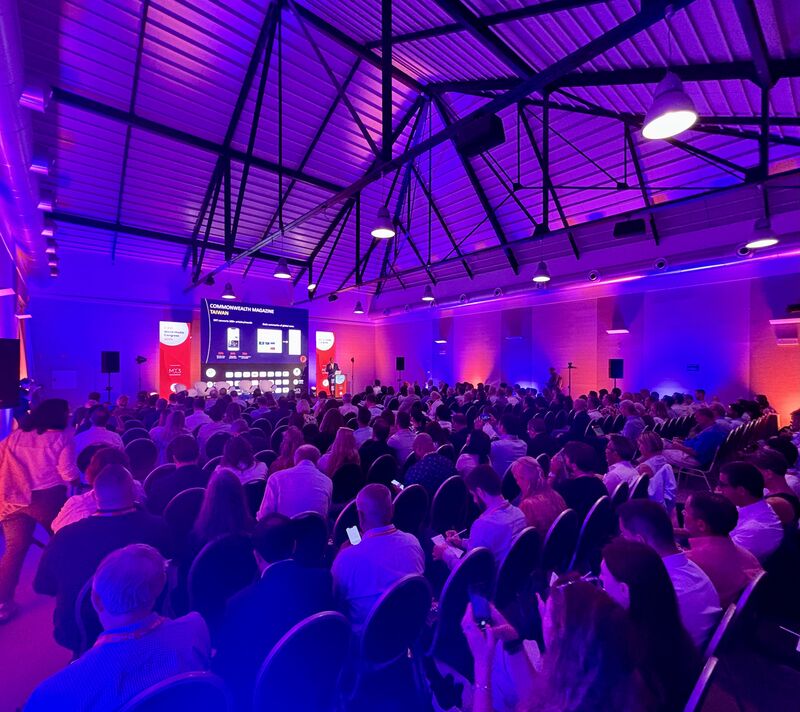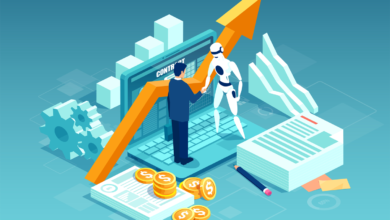FIPP World Media Congress 2024: Artificial Intelligence

At last week’s 46th FIPP World Media Congress held in Cascais, Portugal, one of the central themes was artificial intelligence. To jump or not to jump, and if so, on what terms? These and many other questions were covered across the Congress’ two days. This roundup feature will form part of the 2024 Congress report which will be announced in due course.
In an ironic twist of fate, Day One of Congress saw ChatGPT throw a hissy fit and suffer a major outage worldwide. A few ashen faced executives could be seen typing furiously into their mobiles as the realisation dawned that their carefully configured bots had disappeared into the cyber ether. Welcome to the Age of AI Anxiety. Have your pills ready.
AI was perhaps the key theme of Congress, given the waves of disruption, innovation and opportunity it is set to unleash. We are on the cusp of a revolution we can barely imagine, with today’s media landscape about to witness the same degree of change that was thrust upon it in the 1990’s – and just as with the advent of the internet, the direction of travel won’t be linear.
Use Case First
Yet barely before anyone had time to get gooey eyed over AI, Congress was brought down to earth with a thump as keynote speaker Dr Seth Dobrin announced that “AI was a scam” and that whilst, “Generative AI has the potential to transform every industry, most organizations don’t get value from AI.” That perhaps wasn’t the message most delegates had travelled to hear but as the ex-Head of AI for IBM, Dobrin comes laced with serious credibility.
Dobrin doubled down on the message that AI wasn’t a solution in search of a problem and implored media companies to, “Have KPIs and accountability in terms of $$” and that, “AI will only inspire staff by delivering clear business value.”
The same message was taken up by Steffen Damborg, CEO and Author of Mastering Digital Transformation, who in a later session added that media companies must, “Start with the problem, not the solution, and please note it might not be Gen AI.”
Lawyer Up
With AI still in its early stages, think Internet 1993, Dobrin told delegates in no uncertain terms that, “You shouldn’t use any AI tools unless you’re indemnified” and advised media companies to hire a specialist lawyer who could guide them through the maze of nascent legalities, T&Cs, etc.
In an afternoon session, David Buttle added, “It’s going to take a long time for the legalities to be ironed out, perhaps even up to a decade” yet getting lawyers involved early could stifle some later headaches. Who’s to know whether images trained on other people’s copyrighted images (DALL-E anyone?) could come back to bite them? Buckle up, it’s going to get messy.
Humans aren’t perfect, and neither is AI
Dobrin told delegates that because AI has been created by humans, it will be flawed, stating, “AI tech in today’s form has no way of not hallucinating.” He then calmed a few fears adding, “when AI makes a mistake, it will be a more precise mistake, and it is easier to deal with inaccuracy when it is precise.”
However, it is the biases shown by AI that are the greatest concern. In a separate interview to promote his forthcoming book, AI iQ for a Human-Focused Future, Dobrin said, “AI is developed by dudes in white hoodies in the West, Chinese guys in Beijing, as well as some Indian input too, and a smattering of development in the Middle East.”
“There is no representation either from the Global South or from women, and this is serious, it could easily become an existential crisis – don’t forget that bias is a cultural construct.”
“Basically, we are in the midst of another industrial revolution yet to participate you will have to use AI models that have other cultures’ values baked in. This is colonialism 2.0 driven not by boats, armies or religion, but through technology.”
Dobrin concluded by saying, “all companies must publish their ethical AI stance.”




Water, water, everywhere
If AI biases aren’t enough to keep you up at night, the environmental impact of AI is sure to do the trick – to audience gasps, Dobrin told delegates that for every 25 prompts put into ChatGPT, it uses half a litre of water for cooling. With 1.8Bn visits to ChatGPT in April alone, it doesn’t take a genius to work out the water consumption. If Greta Thunberg is spotted outside OpenAI’s HQ, you’ll know why.
The water consumption comes on top of the copious electric generation needed to power ChatGPT, Prometheus, Gemini, et al. If AI continues its current trajectory, Iceland (so beloved of Bitcoin miners for its geothermal energy) could be the next investment play. Don’t bet against it.
For media companies who have made net zero goals an early 2030 or 2045 target (here’s looking at you The Guardian, Immediate Media, and Bonnier AB), the environmental impact of AI will, of course, need to be factored in now.
Money & Financials
One of the biggest debates at Congress was whether to jump into bed with AI companies or just sue the socks off any company that comes within a whisker of training it’s algorithms on copyrighted content.
Innovation Media’s Juan Señor told assembled delegates that Open AI’s negotiating deck had been leaked and that it offered both fixed fees and variable fees. He added, however, that, “Publishers are just one third of the AI input – 30% Wikipedia & corporate sites, 30% academia, 30% journalism.”
For Dotdash Meredith’s Chief Innovation Officer, Dr Jon Roberts, partnership was seen as the way forward, as he disclosed how his company’s agreement with OpenAI was based on the rationale that, “AI platforms should pay publishers for their content and content must be appropriately attributed.”
He also added how Dotdash Meredith was using AI for D/Cipher, it’s ad targeting architecture for ads based on content and not on 3rd party cookies, “We want to move the value of ads back to the content and AI is playing a key part in this.”
Steffen Damborg was less accommodating, stating, “There is an asymmetric power balance between Big Tech and publishers. They are our worst competitors and are competing for the same audiences. They are also investing billions in talent and software.”
Only journalism can save journalism. You must be true to your brand, invest in talent, and don’t rely too much on GenAI to save your business.
Steffen Damborg
With AI curve balls inbound, perhaps the strongest piece of advice came from David Buttle, Founder of DJB Strategies (and previously a Global Director for the FT) who advised Congress delegates that with AI still in its infancy, publishers must retain flexibility and control by implementing ‘get out clauses’ with their AI partners.
His cynicism is well founded, “Google already scrapes sites in exchange for traffic, but AI breaks this because Google is not delivering the traffic yet you can’t opt out without opting out of its search traffic. So Google is breaking the agreement because it is serving ads against answers created by publishers’ content.”
He has a point.
Who’s Next
Perhaps the last words on AI need to go to two of the media industry’s most respected veterans, Colin Morrison and Steffan Damborg.
Damborg stated, “We used to be laggards, but now we’re early adopters” arguing that publishers are stepping up to the plate in their adoption of new technologies and that makes them better placed to be ahead of the AI curve, not behind it.
With a nod to The Who’s immortal song, Won’t Get Fooled Again, Morrison bluntly concluded, “We’ve seen what happened over the past decade or two with Big Tech. They drove users at vast scale and just as quickly took them away. Let’s not get fooled again.”
Quite.
The power is in our hands.




